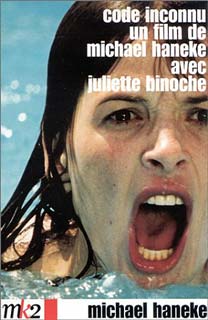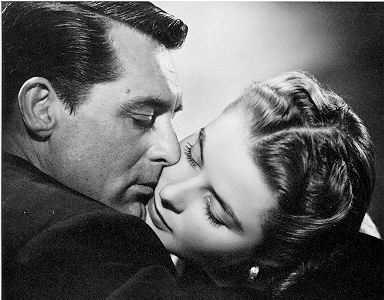Of the thousands of films I've seen, and the many I've written about, this is the one that remains the strangest. And in the twenty years since I first started grappling with it, it's still the one I find most fascinating. Easily.
It's an art film that never lets up on fully immersing itself in a viewer. It submerges you into its world from the very first frame, and it simply never backs off from its opening dream-like moments.
It fuses fantasy and reality to a point where the two get a bit confused. Lots of films do this, but
Eraserhead does it best. In disturbing little scenes, where fear comes to life and actually takes over the bulk of the script, the blending of the real and the outlandish is near lunacy, like a trip into the pit of the surreal.
Eraserhead is "too much" for some, but their distance from the film is telling: They were impatient, or it scared them. They thought it was artsy or self-indulgent. They only watched it once, and wanted to forget it, or they had no desire to interpret its meaning.
The plot is so simple you can spoil it and not ruin a thing:
1. Henry Spencer is invited by ex-girlfriend Mary X. to dinner at Mr. and Mrs. X.'s house.
2. Henry is told by Mrs. X. that during their time apart Mary gave birth, and it is his to care for. His responsibilities in the matter will begin when they are wed.
3. Mary and the baby move in with Henry. Mary is suffering from postpartum depression. She'll have no further sexual relations with Henry, and the baby's crying is driving her over the edge.
4. Mary moves back in with mom and dad. In her absence, Henry watches over the baby and has an affair with "The Beautiful Girl Across the Hall."
5. Abandoned with the child, Henry has nightmares, dreadful daydreams, hallucinations, and awful ideas, both about his own infidelity and the fate of a baby that is growing more sick every day.
6. Henry, in a sort of Abramic despair, in a predetermined act commits the film to true horror by doing the one thing Abraham couldn't -- an act that is either merciful or barbaric, depending on how you want to reason his involvement with the film's world.
The plot serves only to advance an interplay of image and ideas. The film may have a plot, but it's more about relaying a language of expression, particularly the expression of human experience through: sex, fidelity, parenthood (most specifically fatherhood), moral responsibility, fear of abandonment, the alienation of modernity, isolation, resentment, adultery, and what is described best in the Kierkegaardian sense as "introversion" -- knowing your own despair and not finding it in anyone other than yourself.
All of these are expressions of the film's greatest emotion -- fear.
Lynch uses several methods to achieve this language of expression. The first is in letting his actors funnel their character's inward disposition through outward manifestation. Characters seize, violently convulse and atypically smile for prolonged periods of time according to the psychology of the moment itself. In other films, we would credit the actors for relaying these feelings without necessarily showing them. In
Eraserhead it is quite the opposite. Outbursts of inner fears come across so strongly that they shock us with their feelings on display. These are people who express
everything, a shock to normal viewing expectations. Think about it: Do you say everything you always think?
In the early scene at Mary's house the emotions set the tone. The oncoming, inevitable discussion over the birth Mary gave is intense, and it's relayed through seizing and convulsing (both Mary and her mom), and wearing a constant fake smile to bring peace (dad).
Things seem so out of the ordinary because we're seeing the emotional, perhaps the spiritual, brought to a physical presence. Henry wouldn't continue chatting away with mom during Mary's seizure in the living room; likewise Mary and Dad wouldn't simply go on with life while mom goes into convulsions at the kitchen table. Henry might have thought the dinner looked a little undercooked, but the chicken wouldn't wave its legs at his disgust, and mom may be intrigued at the sexuality of her daughter but she wouldn't lunge to seduce Henry when she finally gets a chance to talk to him alone.
Lynch takes this expressionist acting to the extreme in the crafting of the film itself. Relying heavily on its gruesome imagery and its looming, terrifying sounds, the film is constructed and layered to attack viewer expectations. Every aspect of manipulation you've seen in any movie is amplified to extreme proportions -- purposefully so. It works because the bulk of the film is so quiet, suggesting that much of normal life is also quiet, but when the nervous system kicks in, it kicks in hard. (Have you ever found yourself falling asleep while tipping back in a chair?)
Freud would be happy with me, because my reading after a recent viewing is the same as it has always been, although perhaps I have incorporated a bit of depth over time. A subtext of sex runs through every portion of
Eraserhead, beginning right at the start of the film with a sperm exiting Henry in the opening montage, floating endlessly in space until finding its way to a sort of ovum, where it is drenched in a liquid life, eventually bringing about conception. Henry's sperm -- gigantic, like everything else in
Eraserhead -- is a recurring theme throughout the film: it's between Henry's sheets, representing masturbation after his wife's rejection; it's being stepped on in his dreams, like the ones that got away; and in a final scene in direct confrontation with Henry, one is standing up on end and hissing angrily at him -- while his child, which resembles the creature, taunts and laughs when he can't locate The Beautiful Woman Across the Hall for sex.
In
Eraserhead, sex is portrayed more honestly than in much Hollywood fare: sure, it is a fascination, an object of desire, but it's also something to fear, and even fear its humiliation. It has the power to create, but its drive has the power to tear apart and ultimately destroy.
Suggestions of determinism in the sexual are found in an unknown figure called "Man In The Planet," a behind-the-scenes Dark lord who predestines events by flipping this or that switch in the universe -- he's the one responsible for driving the giant sperm to its final location for conception (a large hole of light lined with what appears to be pubic hair). There is a
something, even
someone at work behind the scenes. Whether he's a deity or an unnameable force we're uncertain, but whatever he is, he assigns Henry to his fatalistic role. The Man In The Planet guides the sperm, creates the birthing process, and throws the switch at the end which launches Henry into the furious motion of the dreaded grande finale.
Henry, the abandoned father, the alienated man in his dark, one room apartment, dreams of a glowing, dancing lady in the radiator. After climaxing with The Beautiful Girl Across The Hall, Lady in the Radiator sings about heaven. The placement of the song "In Heaven Everything Is Fine" is usually taken out of context, but we need to remember that it was sung shortly after Henry's infidelity, actually culminating in his adulterous climax. The sexual innuendo is endless in
Eraserhead, but so too are the ramifications. Very shortly after the episode of adultery, Henry finds his own head cut off (his mind racing with the insane pace of the new world he finds himself in). His brain might as well be ground into erasers at this point, so naturally, in this film, it is.
I agree with a few online friends who have said the film changes as you age and have kids. Fatherhood and the fear of failure as a man stand out to me now that I have kids. I didn't read the film that way when I first saw it years ago, but since then have dealt with things like colic, crying, postpartum depression and restraining your anger in the heat of the night. Having a baby can truly be a maddening experience, especially if you're like Henry and are not prepared. The deformed creature, that crying baby, is monstrously ugly because it is perceived that way by unprepared parents. It's an intrusion, unwanted, and they're left to the daunting task of somehow keeping this sick thing alive.
Sonically, there are few films that rival
Eraserhead. The sound in the film is overwhelming. Even thirty years later the sound is a mark of the film's genius. Easily remembered are: the space sounds when Henry's sperm is fully launched, the carnival music as Henry meanders along, the hissing radiator and ticking clock always present in the apartment, and the howling wind when the baby won't sleep at night. Perhaps the most jarring sound of all is ripped straight from earlier b-movie horror: upon noticing for the first time how sick the child is, a dramatic organ chord with bellowing pedal tones comes crashing out of nowhere, a jarring effect in what was once a quiet scene. The wrestling between silence and atmospheric fury sets the tempo for the visuals people remember.
There's a brilliant piece of writing on Lynch, from his early days in school, his struggle with his first films, and the making of
Eraserhead. It's
Here. It's been on the web for quite a few years, and seems to be reprinted from a magazine sometime in the early 80s -- it's fair to assume that the info there is accurate. It's one of the better pieces of writing about the film on the web.
At the site there's a capsule about
Eraserhead that, to me, brilliantly sums up why the film draws the viewer in: "What Lynch does is to distort what is familiar; at first one perceives it as strange, but as one gradually comes to see its familiarity, one is forced to reevaluate what is usually accepted without question. By showing us the familiar in the strange, he makes us aware of what is strange about the familiar."



















